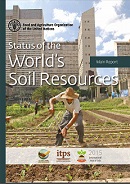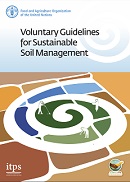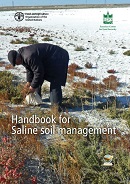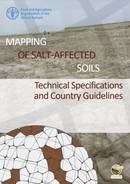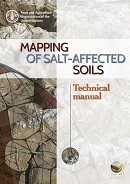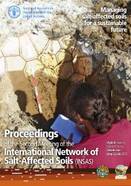
International Network of Salt-affected Soils
The International Network of Salt-Affected Soils (INSAS), launched in 2019 during the International Center for Biosaline Agriculture’s (ICBA) first Global Forum on Innovations for Marginal Environments, is a Technical Network of the Global Soil Partnership (GSP) and follows its Rules of procedure. The Network aims to facilitate the sustainable and productive use of salt-affected soils for current and future generations.
INSAS's mission is to support and facilitate joint efforts towards the sustainable management of SAS for food security, agricultural sustainability and climate change mitigation.
For more information contact: [email protected] and the: GSP-Secretariat.

The International Network of Salt-affected Soils has compiled a series of photos of saline and sodic soils and landscapes in a calendar for the year 2023.
Download, print and enjoy the beauty of saline and sodic soils in their natural habitats and see how salinity becomes a threat to crops that cannot tolerate high levels of salt.
DOWNLOAD: High-resolution file for printing | Low-resolution file for web
You are encouraged to print this calendar and share it within your networks and with your contacts.
INSAS functions and duties
Soil salinization and sodification are major threats to global food security and to the achievement of the Sustainable Development Goals (SDGs) as identified in the Status of the World Soil Resources report (FAO and ITPS, 2015).
In the last decade, there have been several global fora on salt-affected soils: SPUSH meeting, Global Forum on Salinization and Climate Change, Valencia, Spain 2010; International Conference on Soil Classification and Reclamation of Degraded Lands in Arid Environments, Abu Dhabi, UAE 2010; the Third International Salinity Forum, Riverside, USA 2014; Saline Futures, Leeuwarden, the Netherlands 2019. They highlighted the importance of working towards an integrated approach to the management of salt-affected soils that converges soil, water and plant knowledge with practical solutions through joint actions of scientists, international organizations, research institutions, farmer associations, policy makers, and governments.
To address this need, members of the Global Soil Partnership (GSP) as per recommendation of its Intergovernmental Technical Panel on Soils (ITPS) have endorsed the establishment of the International Network of Salt-Affected Soils (INSAS) during its Plenary Assembly on 5-7 June 2019, in Rome. The launch of INSAS took place during the Global Forum on Innovations for Marginal Environments on 20-21 November 2019, in Dubai.
The main goal of INSAS is to facilitate the sustainable and productive management of salt-affected soils for current and future generations.
The establishment of this network has the following objectives:
1. To promote the sustainable management of salt-affected soils;2. To develop a harmonized approach and indicators for the assessment, mapping and monitoring of salt-affected soils;
3. To develop guidelines and manuals on good practices for the sustainable management of salt-affected soils;
4. To provide a platform for countries with salt-affected soils to discuss common issues related to the most suitable methods for protection from deterioration and the sustainable management and reclamation of salt-affected soils, as well as establish a network of experts on salt-affected soils to share and develop further knowledge on the issue;
5. To foster collaboration among INSAS member countries towards promoting the sustainable use and management of salt-affected soils, identify relevant knowledge and research gaps and promote regional and global joint research and development programs;
6. To enhance the collaboration between scientists, practitioners and policy-makers aimed at the sustainable management of salt-affected soils;
7. To serve as a platform for capacity development, knowledge sharing and technical cooperation on salt-affected soils monitoring and management;
8. To advocate towards the halt and reversal of the negative trends in expansion of salt-affected soils through different instruments.
Check the FAO DG Xu Dongyu video message
| INSAS Governance | |
| Chairman |
Prof. Dr. Jorge Batlle-Sales, University of Valencia, Spain |
| Vice-Chair | Dr. Katarzyna Negacz , Vrije Universiteit Amsterdam, the Netherlands and Dr. Meisam Rezaei , Soil and Water Research Institute, Iran |
| ITPS Salinity Working Group |
Ghiath Alloush, Syria Saeed Saadat, Iran Nopmanee Suvannang, Thailand Rosa Maria Poch, Spain |
INSAS Coordinator: Maria Konyushokova
Any partner of the FAO Global Soil Partnership can become a member of INSAS. To become a partner of the Global Soil Partnership, please register through the form here
National institutions, academia, NGOs, civil society, farmer associations, and other stakeholders interested to participate in the joint action to achieve the sustainable and productive management of salt-affected soils are welcome to join this network.
To join the network, please fill out the online form available in English.
You can also download the form in English | French | Spanish, and send it to [email protected] and [email protected] in cc.
Geographical distribution of INSAS members
Main activities
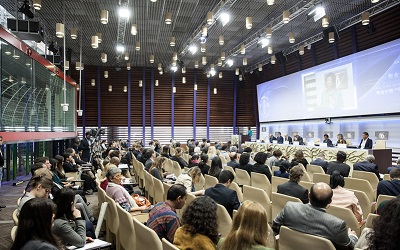
Global Symposium on Salt-affected Soils
20-22 October 2021, online
The Symposium was a science-policy meeting, organized by the Food and Agriculture Organization of the United Nations, its Global Soil Partnership (GSP), the Intergovernmental Technical Panel on Soils (ITPS), the International Network of Salt-Affected Soils (INSAS), the Science Policy Interface of United Nations Convention to Combat Desertification (SPI-UNCCD), the Government of the Republic of Uzbekistan, the Global Framework on Water Scarcity in Agriculture (WASAG), the International Union of Soil Sciences (IUSS) and the International Center on Biosaline Agriculture (ICBA).
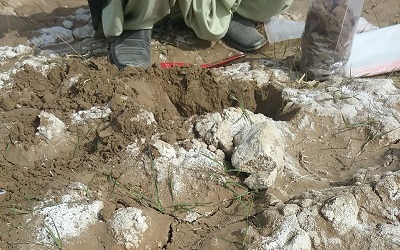
Capacity development on saline soil
Handbook and training on salinity in Eurasia
This capacity development training was organized by the Food and Agriculture Organization of the United Nations, its Global Soil Partnership (GSP), the Eurasian Center for Food Security, and the National Scientific Center “Institute for Soil Science and Agrochemistry Research named after O.N. Sokolovsky” (NSC ISSAR). It was held on 26-29 September 2017 in Kharkiv, Ukraine for the Eurasian region with the objective to train on technologies to sustainably manage saline soils.
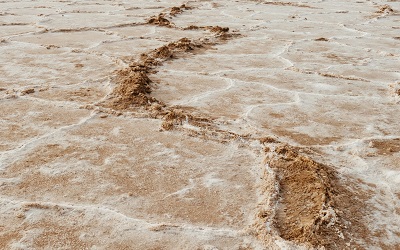
Call for projects for Eurasian countries
The GSP subregional partnership and the ECFS
Eurasia characterizes for salt-affected soils that put at risk food security and the achievement of the SDGs. Two calls for projects on soil research and on soil salinity mitigation and adaptation are launched annually to facilitate targeted research and partnerships.
Related activities
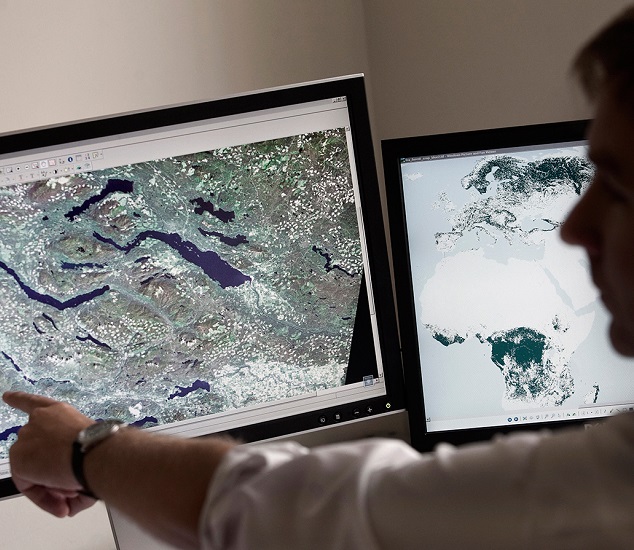
Global map of salt-affected soils
Launched on 20 October 2021
The new GSASmap based on FAO-GSP country-driven approach, gives updated information on the distribution of salt-affected soils worldwide. This map is important to identify hotspots where sustainable soil management practices should be adopted to halt salinization and lay ground for future periodic monitoring.
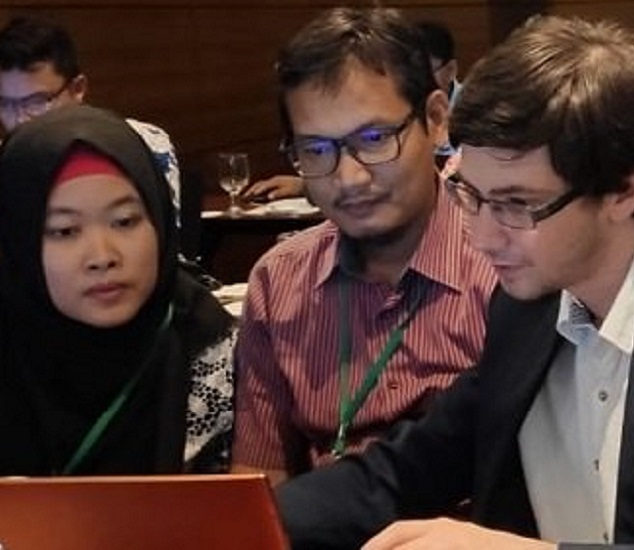
Global Soil Salinity Trainings in all regions
Capacity development at global scale
Through eight regional trainings, the capacity development programme organized by FAO-GSP, reached 133 countries and more than 400 experts to produce the global salinity map.
Global Status of Salt-affected Soils
FAO publication: expected release in 2022
The report on the Global Status of Salt-Affected Soils is focused on the salt-affected soils extent and intensity of salt levels in the soil at the national, regional and global scales.
INSAS meetings

Third meeting on INSAS
Hybrid | 27-31 May, 2024
Among the diversity of the world’s soils, salt-affected soils are a group that have a distinct specificity. Many are primary or naturally saline soils, which range from mangroves, marshes and coastal wetlands to inland salt flats and ancient sea beds..

Second meeting on INSAS
Hybrid | 22-26 May 2023
The salinization and sodification of agricultural land is increasing due to climate change, water shortages, and unsustainable farming practices. Forecasts indicate a 23 percent increase in global drylands by the end of the 21st century. Moreover..
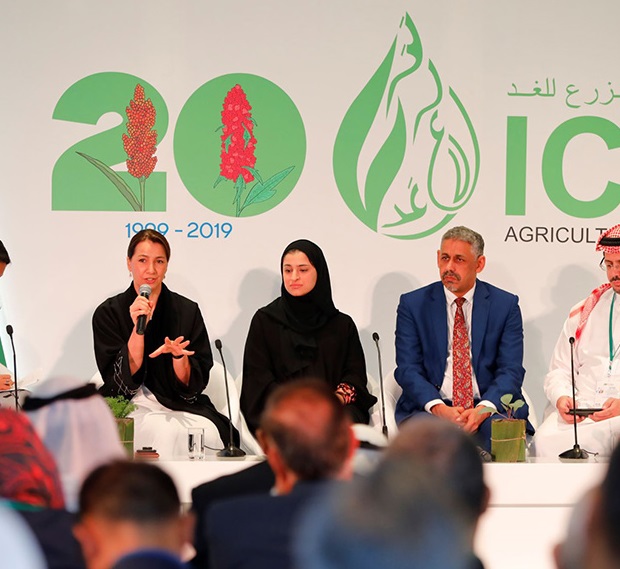
First meeting on INSAS
Virtual | 14-15 April 2021
The mission of INSAS is to support and facilitate joint efforts towards the sustainable management of salt-affected soils for food security, agricultural sustainability and climate change adaptation and mitigation..

Launch of the International Network on Salt Affected Soils
International Center for Biosaline Agriculture (ICBA), Dubai, UAE | 21 November 2019
On the occasion of the ICBA 20th anniversary celebrations, the Global Forum on Innovations for Marginal Environments (GFIME) was organized..
INSAS Webinars

Crop nutrition in salt-affected soils
Virtual | 24 April 2024
During this online event involving researchers, practitioners, and stakeholders from around the world, we will focus on the challenges and solutions for crop nutrition in salt-affected soils. The participants will discuss..

Salinity in Sub-Saharan Africa: Impacts and Initiatives
Virtual | 25 March 2024
During this online event involving researchers, practitioners and stakeholders from the region, we will focus on the challenges and solutions for soil and groundwater salinity as well as crop production issues related to soil salinity in sub-Saharan Africa. The participants will discuss..

eHALOPH and the economic uses of salt-tolerant plants
Virtual | 13 February 2024
This event promises to be an enriching and engaging online gathering bringing together experts, researchers, and practitioners from around the world to share their knowledge and experience. During this webinar..

Health of salt-affected soil
Online | 21 November 2023
The webinar is the first in a series of webinars organized by the International Network of Salt-Affected Soils of the Global Soil Partnership, an initiative which is aimed at awareness raising on sustainable management of salt-affected soils for food security, agricultural sustainability and climate change mitigation.
Constitutional documents
Related documents
Related publications
Status of the World's Soil Resources. Main report and Technical summary (EN | ES | FR)

